We’ve refreshed the content of this article as of January 2025. The updates, tweaks, and expansions were expertly done. This is the most up-to-date information you’ll find right now on the best tools for SEO.
If you’ve just dipped your toes into the world of SEO, you’ve probably noticed there’s a plethora of SEO tools out there, both free and paid, to enhance your site’s ranking according to Google’s guidelines.
So many, in fact, that you might have felt overwhelmed when trying to pick one. To simplify this choice, the question isn’t about which is the best SEO tool, but rather, which one do you need?
The fact is, most SEO positioning tools have a unique feature or set of features that make them stand out. Thus, your choice should hinge on your needs, whether it’s improving On Page, conducting keyword research, launching a link building campaign, or analyzing competitors, among other things.
So, to assist you in this endeavor, we’ve crafted the most comprehensive list of SEO tools for website ranking, aiming to cover virtually all the SEO needs for your site or your clients’.
Plus, to make it as straightforward as possible for you, we’ve summarized the main utility of each SEO tool in a single sentence, along with its strengths and weaknesses.
Ready to dive into our top SEO tools of 2025?
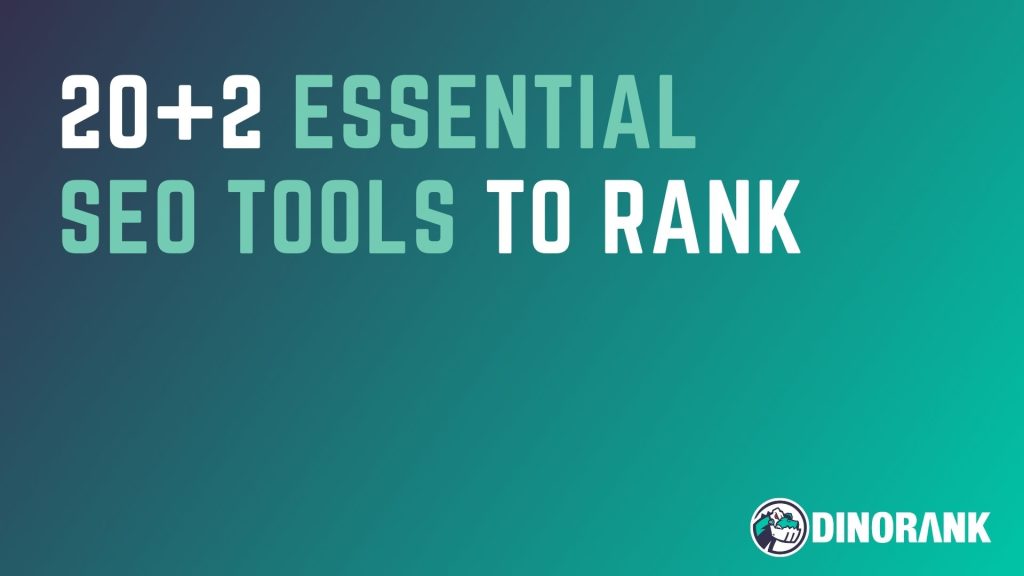
Which SEO tool should you choose?
Let’s tackle the million-dollar question head-on. As we’ve mentioned, your choice will depend on your needs. But if your daily tasks involve managing various SEO aspects, we genuinely recommend seeking out the most comprehensive tool available.
I believe this is especially crucial if you’re new to the field, so you can have everything under control in one tool, preferably one that’s user-friendly.
Bear in mind, the more technical SEO tools tend to be the hardest to use effectively. Unless you’re managing a website with several hundred thousand URLs, you typically won’t need those advanced features.
Similarly, there are SEO tools like Semrush and Ahrefs, loaded with a vast array of functionalities you might never use. So, be aware that paying for the most expensive tool doesn’t necessarily mean you’ll get better results.
Again, this message is particularly aimed at those just starting out in SEO, as they might not fully tap into the potential these tools offer.
So, the list of SEO tools you’ll find in this roundup are both viable and self-sufficient. With any of them, you can manage the SEO of your website or niche to about 80% of what a pro would achieve.
I assure you that with any of these tools, you’ll handle SEO at a level more than adequate to rank and compete in any niche or industry.
List of the Best SEO Tools to Boost Your Website’s Google Ranking in 2025
As I mentioned at the start of this article, your choice should align with your specific needs, which is why I’ve categorized this list based on functionality.
Top All-in-One SEO Tools:
- SERPStat
- DinoRANK
- SEO PowerSuite
Best Tools for Keyword Research:
- Mangools
- Keyword Revealer
- KeywordTool.io
- Cognitive SEO
- Ahrefs
- Sistrix
Best Tools for SEO Audits:
- Majestic
- Cognitive SEO
- Netpeak
- SEranking
- SEO SiteCheckup
- Link Explorer
Top Free SEO Tools:
- Screaming Frog
- Google Trends
- Google Search Console
- Google Analytics
Best SEO Extensions:
- SEO Minion
- Keyword Surfer
Let’s delve into each of them in more detail.
SERPStat: Assess your ranking at a glance.
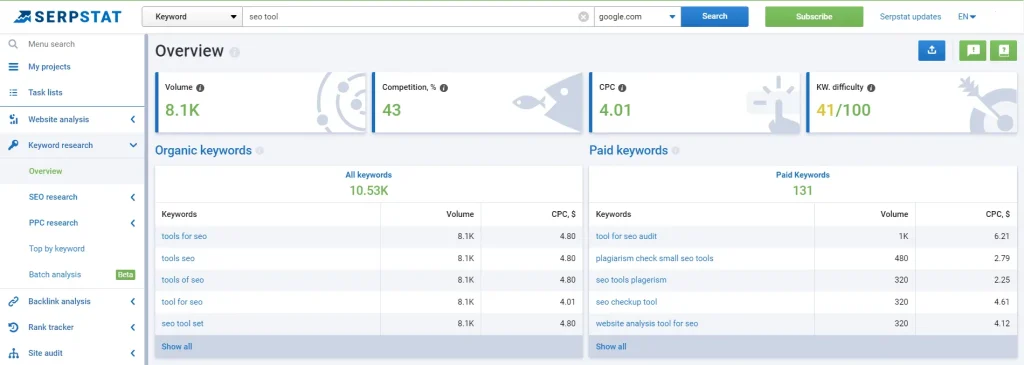
SERPStat gives you a broad overview of your website’s (or your competitor’s) ranking status with just a single glance.
| Pros | Cons |
| Beginner-friendly | Offers a limited free version |
| Doesn’t delve too deeply into analyses | Lacks comprehensive backlink analysis |
| Features an intuitive and user-friendly interface |
We’re kicking off this list of SEO tools with SERPStat, an all-in-one solution that caters to various aspects of your website or blog’s SEO: from conducting keyword research to generating content using AI.
However, the real standout feature of this tool is its URL analysis. It provides not only data on SEO rankings in Google search results but also a breakdown of domain positions in the SERPs, the pages with the highest visibility, and even identifies your top competitors.
In short, it offers a comprehensive snapshot of the SERPs with just one click.
Additionally, you’ll receive a list of keywords your website ranks for, their search volumes, and individual rankings. Without a doubt, SERPStat furnishes essential and invaluable insights, ensuring you start on the right foot and avoid shooting in the dark.
DinoRANK: The SEO Suite That Truly Does It All
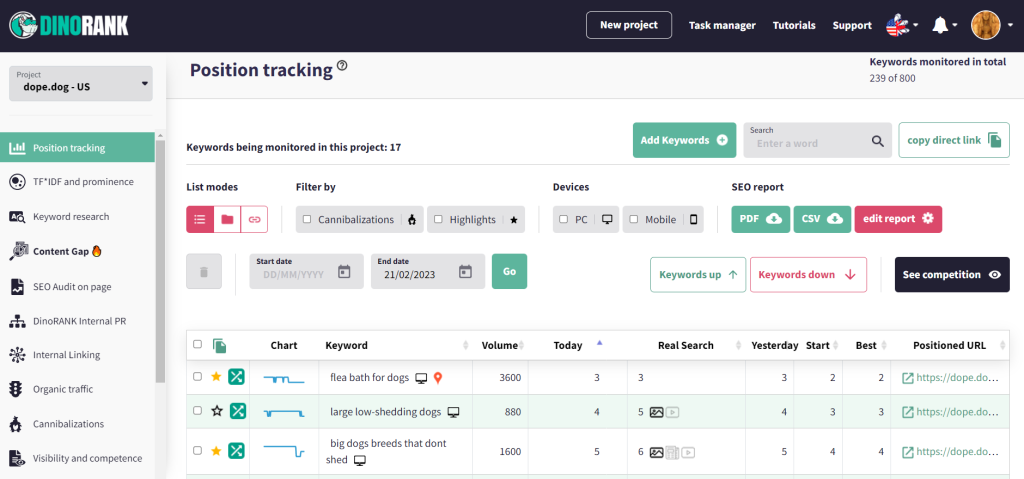
DinoRANK is an all-in-one SEO suite, meaning you can handle all aspects of your website’s SEO within a single platform.
| Pros | Cons |
|---|---|
| Outstanding value for money, easy to use and understand | Might feel limited for agencies needing sheer power |
| Allows all functions a website needs to gain traffic and outdo competitors | For a robust plan, you’ll need to upgrade from the initial offering |
| Regular monthly updates | Currently, they don’t offer a free trial |
DinoRANK is an all-in-one SEO tool that lets you manage nearly every aspect of your website’s SEO. Originally, it was heavily geared towards keyword research and on-page optimization, providing features for audits and internal linking, among others.
However, this tool is continuously evolving. Over recent years, they’ve added an external linking module (for off-page SEO) and a module for AI-powered text generation.
Moreover, its user interface is quite intuitive. As a result, 80% of SEO practitioners can effectively use DinoRANK, while the remaining 20% are typically advanced users or large agencies.
SEO Powersuite: A Suite for Those Just Starting Out
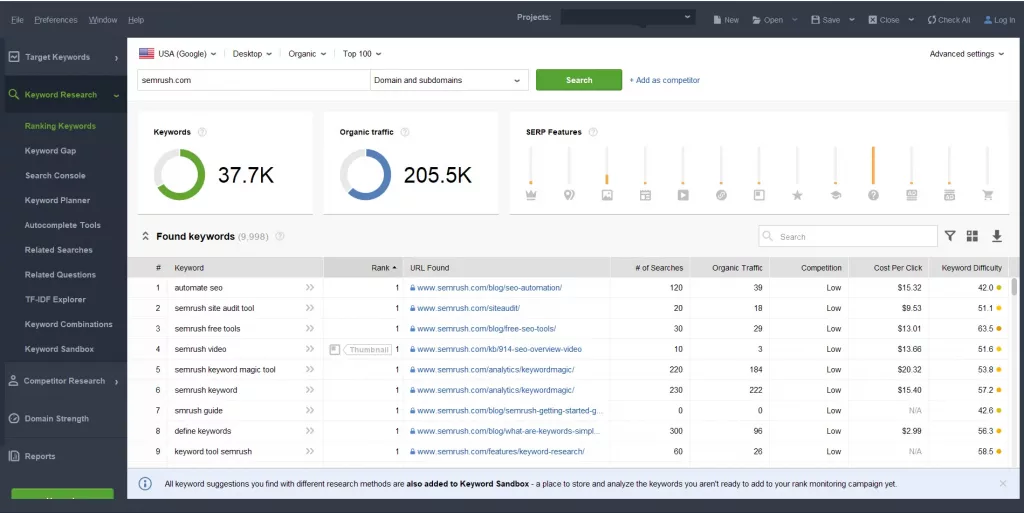
SEO Powersuite can automatically rank keywords
| Pros | Cons |
|---|---|
| Suitable for projects of any size | Requires software download on your computer |
| Allows automation of many tasks | Its tools are split into different applications |
| No limitations on domains or keywords | No discounts for purchasing all the tools |
SEO Powersuite is a comprehensive and user-friendly tool, making it an excellent recommendation for those just diving into the world of SEO. This tool boasts a robust rank tracker, thorough SEO audit capabilities, and a backlink module complete with an assistant feature.
Furthermore, it’s equally adept at handling small projects as it is with larger ones boasting tens of keywords. This ensures you won’t need to switch tools as your website begins to expand.
One of its standout features is its Rank Tracker, which allows you to monitor whether your website is climbing or falling in Google’s search result rankings.
You can also keep an eye on competitors’ movements and receive reports on the progress of your projects, ensuring you’re always in the loop about the quality of your efforts. This means you can promptly identify and rectify any missteps you might be making.
So, what sets SEO Powersuite apart from other tools? For starters, it monitors vertical rankings for images, videos, and news. Plus, it alerts you about potential keyword cannibalization on your website, to name just a couple of unique offerings.
While some of these features may seem niche, they can be particularly valuable for specific needs.
Best Tools for Keyword Research
After exploring the all-in-one tools, let’s dive into tools that focus on specific facets of SEO, especially if you’re looking to hone in on one particular area of SEO.
And of all its dimensions, let’s kick things off with tools dedicated to keyword research.
Mangools: Streamline your keyword management
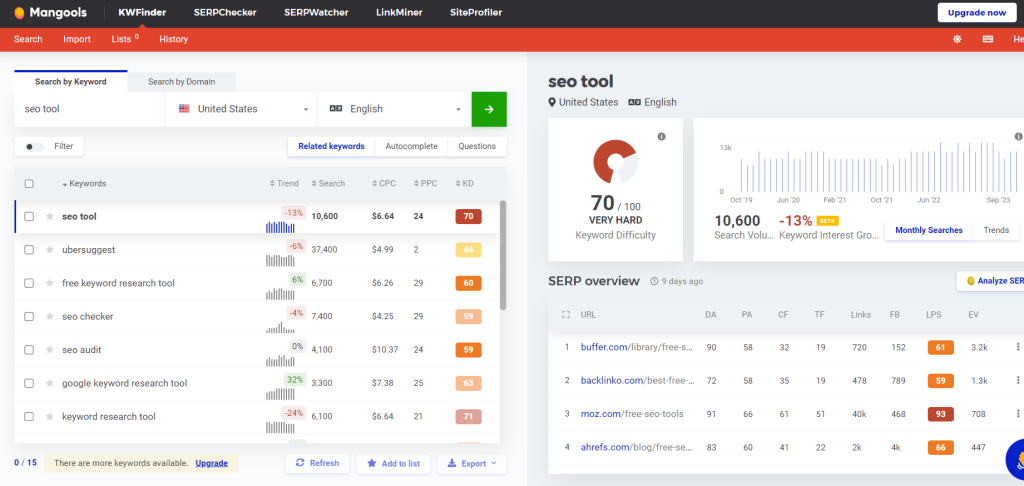
Mangools is a comprehensive SEO suite designed to help you pinpoint the most profitable keywords for your projects
| Pros | Cons |
|---|---|
| Powerful keyword tool | Not ideal for agencies or consultants |
| Affordably priced | Smaller database |
| User-friendly for beginners | Doesn’t offer a free plan |
Mangools is an SEO toolkit encompassing various modules, from SERP tracking to external linking. But if one had to stand out, it would undoubtedly be their KWFinder. It offers a granular level of detail when it comes to your keyword research.
Some of the insights you’ll gain from this module include a highly accurate volume for each derived keyword, its trend over the year, the cost per click or CPC, and the competition level.
However, the true gem of Mangools’ KWFinders is its knack for analyzing long-tail keywords. Their significance? They offer a clearer glimpse into the user’s search intent compared to typical keywords.
Despite their importance, these keywords often go overlooked. Seizing upon them could very well be your edge over competitors.
Keyword Revealer: Unmask the Competition Behind a Keyword.
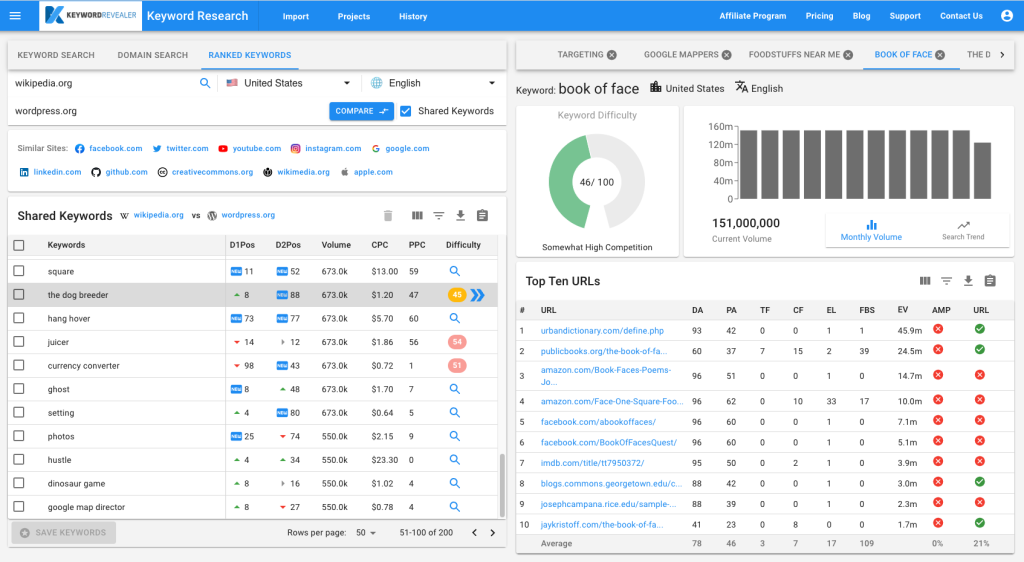
With Keyword Revealer, you’ll uncover keyword insights such as monthly search volume and its CPC
| Pros | Cons |
|---|---|
| It’s free | Sometimes it doesn’t accurately detect keywords |
| Highly useful for pinpointing keyword competition | Limited to 3 uses per day |
| Pulls data from Google’s Keyword Planner |
Looking for free SEO tools? Here’s the first of many: Keyword Revealer.
There are plenty of free SEO tools out there, so many that you’ll find a dedicated section for them later on. So why have we included this tool in this section? Primarily because it’s 100% focused on keyword research.
And, for being free, we have to say it does a really great job.
However, there’s a catch.
That said, you can only use this tool 3 times a day and it provides 50 results; if you want more, you have to start paying.
However, the information it provides is solid and will allow you to gauge the competition for a specific keyword, meaning the challenges you might face when trying to rank for it in search engines.
This way, you can confidently decide whether it’s worth targeting content towards that keyword or if you might be better off looking for another. Sometimes, we get too fixated on one keyword without considering that we might achieve more with an equally valid alternative.
To give you an example… Do you think it’s worth focusing on a keyword with a lot of searches but also heavy competition?
Keywordtool.io
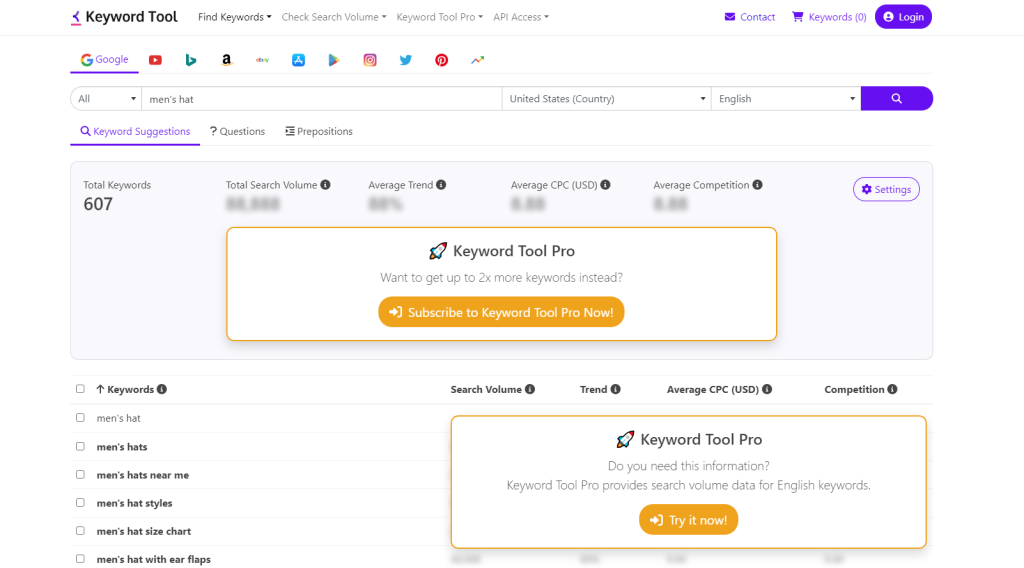
Keywordtool.io provides search data not just from Google but also from Amazon, YouTube, Instagram, and Twitter, among others.
| Pros | Cons |
|---|---|
| Great alternative to the Adwords Keyword Planner | Sometimes only displays results in English |
| Finds more keywords than most tools | The free version doesn’t display search volume |
| Shows results from Amazon and eBay | To export data, you need to upgrade to a paid version. |
Its reliability stems from its ability to extract information from Google’s autocomplete feature – precisely where you’re aiming to position your website. This makes it a valuable asset for targeting long-tail keywords, especially if you’re aiming to drive traffic quickly to newer sites with lesser authority.
Moreover, it presents each keyword with its respective volume and distribution throughout the year.
Knowing the seasonality of certain keywords can significantly benefit your content creation and link-building strategies. It helps you determine the optimal times of the year to leverage the popularity of a specific keyword, allowing for a more targeted approach.
Similarly, the fact that this tool pulls data from other search engines can be invaluable if, for instance, you’re establishing an Amazon affiliate niche. This allows you to directly tap into the search queries from the platform itself.
If you’re crafting a social media marketing strategy, Keywordtool.io enables you to grasp the search intents on platforms like Instagram and Twitter.
Moreover, Keywordtools.io features a section dedicated to competitor analysis. By diving into this, you can see the keywords your competitors rank for and strategically position yourself to vie for the top spots on the SERPs.
SEMrush: A comprehensive yet intricate tool
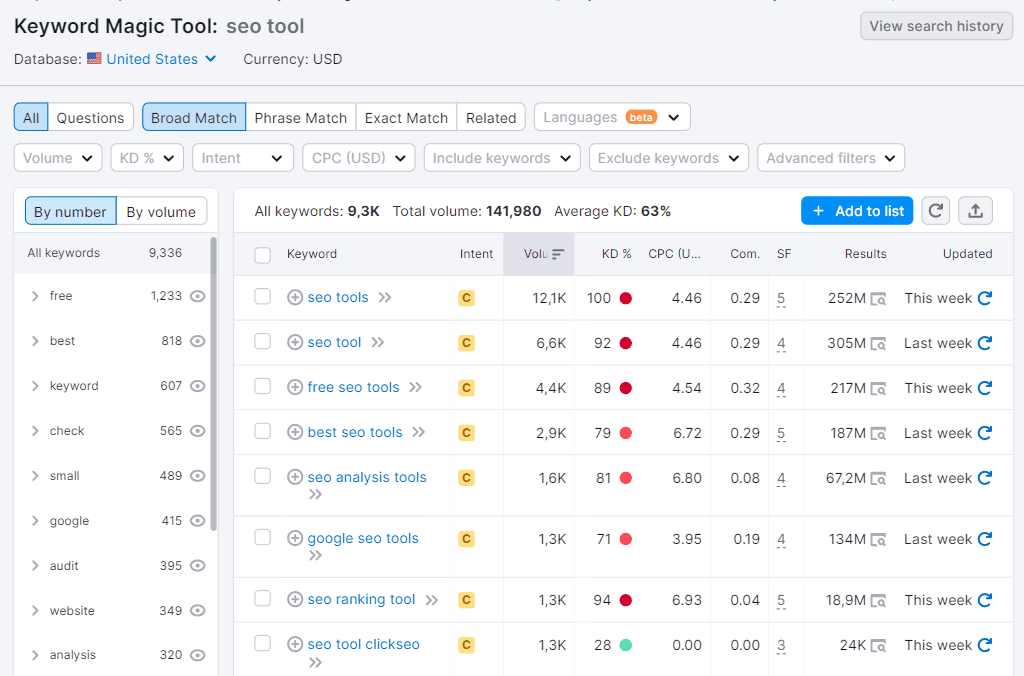
SEMrush provides daily updates and weekly reports on your website’s rankings straight to your email.
| Pros | Cons |
|---|---|
| Recommended for agencies and consultants | It’s one of the priciest tools on the market |
| Its keyword research is among the most comprehensive | Can be complex for beginners |
| Useful for both SEO and marketing | Its interface is not intuitive |
As its name suggests, SEM, this tool for SEO was originally focused on Search Engine Marketing. That is, not based on organic positioning but on paid positioning.
However, over the years, it has evolved to include SEO-specific modules. As a result, today I would describe it as a quite comprehensive SEO and SEM tool.
So much so, that many consider it the best SEO tool on the market.
Since this is a list of the best SEO tools, we’ll set aside the SEM part and focus on its Position Tracking, as it’s a really good module to get daily tracking of your website’s positioning based on one or more keywords.
In other words, you can always know the exact position and see the movements of your keywords in the SERPs.
Another very interesting feature of SEMRush is the creation of daily historical data for up to 60 days, after which they turn into weekly points. This way, you can have a comprehensive report on the evolution of your website’s positioning to check the effects of your work.
Moreover, with the Guru and Business subscriptions, you can import historical data from other platforms like MOZ, SE Rankings, or SearchMetrics.
Lastly, we must mention that its Linkbuilding panel has significantly improved in recent years, offering a really detailed insight into link profiles and individual links, be they inbound or outbound.
Clearly, it has done this to go head-to-head with its main rival: Ahrefs. Haven’t heard of it? Let’s take a look at it then.
Ahrefs
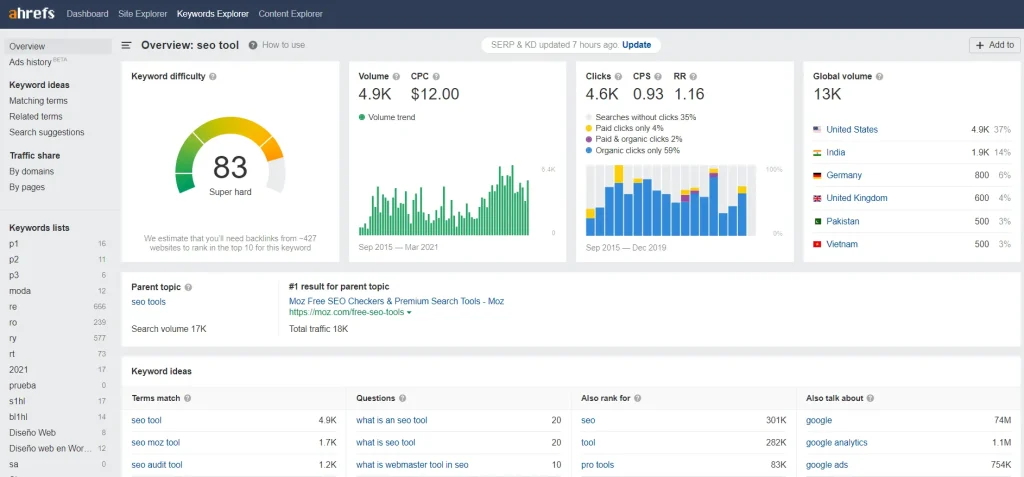
Ahrefs es la mejor herramienta SEO para medir los enlaces entrantes y salientes de cualquier sitio web
| Advantages | Disadvantages |
|---|---|
| Probably has the best link database | Has few filters for analyzing inbound domains |
| Best tool for monitoring Google’s featured snippets | Doesn’t have a user-friendly interface |
| Its visibility graph is very precise | Its price has risen significantly in recent years |
Another SEO tool suite that’s well-known to virtually anyone in the world of optimization is Ahrefs, not just because of its plethora of features but because it possesses one of the best link indices currently available on the Internet. It’s not one of the cheapest SEO tools on the market, but we assure you it’s worth every penny.
Thus, one of the strong suits of this tool revolves around link building and keywords. However, in this case, we’d like to highlight its Rank Tracker reports.
It’s as simple as specifying the keywords you want to track along with their location and waiting for the tool to send reports directly to your email. You can also receive notifications on your desktop and mobile.
If you need to check a specific keyword at any time, you simply need to visit Rank Tracker to verify its positioning.
As you perform these actions, a historical graph will be created, showcasing the ranking of these keywords over time. Furthermore, you can compare your positions with your competitors, turning Ahrefs into an outstanding SEO ranking tool.
They also recently released a free version of the tool so that you can analyze your website. Thanks to this module, you can conduct a weekly audit of all the on-page aspects found on your site, as well as view incoming links.
This is a truly effective way to keep track of the main aspects of your website with all the power that this free online SEO tool offers.
Sistrix, the most powerful visibility graph
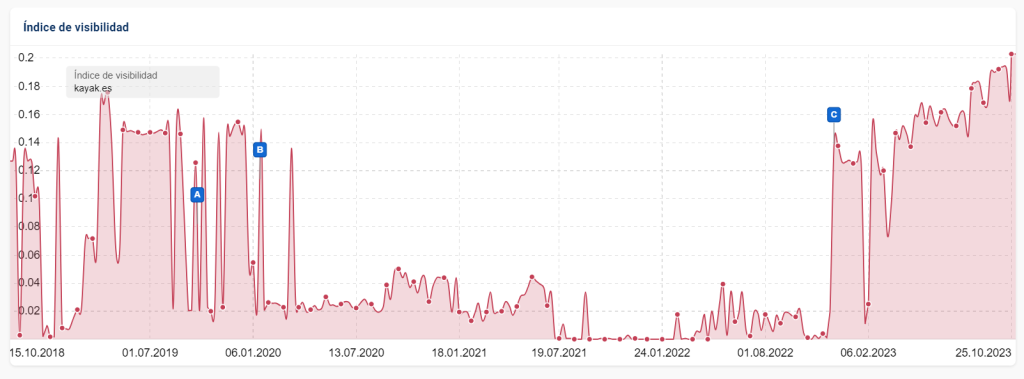
Sistrix allows you to obtain data on the positioning of competitors, something you can’t do with Google Analytics or Google Search Console.
| Advantages | Disadvantages |
|---|---|
| Has a very powerful visibility chart | It’s a very costly tool |
| Presents data in a very simple way | Doesn’t allow you to include your own keywords |
| Monitors Google’s algorithm changes |
And with Sistrix, we complete the round-up of the best SEO tools to improve and measure a website’s ranking. It’s another very popular suite that has its own visibility index, a figure that measures how visible your webpage is in Google’s search results.
This way, you can measure the effects of your SEO strategy and also how Google’s algorithm changes affect your websites.
Over time, the visibility index creates a very visual chart where you can check the evolution of your website’s ranking, marking the different actions you’ve applied to see how they have worked almost in real-time.
Additionally, you can add the data of your main competitors so that you can see at a glance how you evolve compared to them on the same chart.
However, you must be aware that this visibility index is not measuring the traffic to your page, and that’s precisely why it’s a very reliable measure for working on your website’s SEO.
What it does is highlight the changes that occur in a website’s ranking, both positive and negative, in order to identify the causes of those changes and act accordingly.
The best tools for conducting a thorough audit and managing link building
Having seen the tools for keyword research, let’s discuss the tools you should use to conduct the best SEO audits and execute your link-building strategy.
As you’ve observed so far, there are All-In-One tools that allow you to perform several of these functions. However, we want to highlight those that are especially effective in these areas.
Knowing how to perform an SEO audit, that is, a deep analysis of a website, is vital especially if you work for others, whether independently or in a marketing agency, as your clients will want to know the status of their website, what’s wrong with it, and how you can address any issues it might have.
It’s a meticulous job that takes hours, and fortunately, there are tools that can help you get the data you need.
However, when we talk about audits, we should keep in mind both On Page and Off Page audits, more specifically those related to link building. This is because, to gain visibility, in certain cases we will need to resort to acquiring links.
However, since Google is becoming stricter with this practice, you need to monitor key aspects of your website (and competitors) related to link building, such as your link profile, types of anchor texts, and the quality of the links.
Majestic SEO
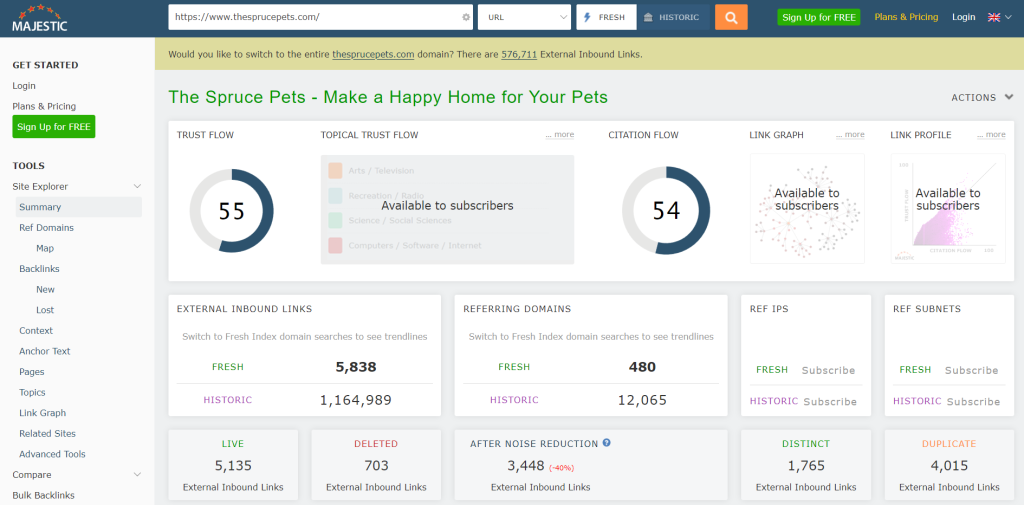
| Advantages | Disadvantages |
|---|---|
| Can create multiple customized reports | Inaccurate backlink detection |
| Very easy to handle | Estimated position tracking |
| Has a very useful Chrome extension | Need other tools for certain data points |
We have chosen Majestic SEO first and foremost due to the tremendous quality of information it provides about any link. It not only informs you about the linkbuilding quality of a website in general but also translates it into its level of authority quality.
In other words, a website might show very good results when assessing its authority but then have a relatively poor link system, or vice versa. Thanks to Majestic, you can obtain both sets of data and evaluate the genuine quality of a website in terms of linkbuilding and authority.
Majestic boasts a range of metrics for analyzing links, making it one of the best tools in the market for linkbuilding work, as its margin of error is near zero.
Of all its metrics, I would like to place special emphasis on both TF and CF, as they provide really valuable information about the medium we want to analyze.
- Trust Flow (TF): measures the quality of links pointing to a website.
- Citation Flow (CF): Measures the number of links pointing to a website, without considering the quality of those links.
These 2 aspects are very powerful whether you’re analyzing a competitor or a medium in which to purchase a link.
On the other hand, information about backlinks is presented in the form of charts that provide information about the most commonly used anchor texts and their frequency, link loss, whether links are follow or no-follow, and so on.
In short, everything you might need to fine-tune your linkbuilding strategy and check how it’s working with the utmost precision.
Likewise, in addition to having great control over the external linking of any site, this SEO analysis tool also provides a vast amount of information about internal links and, even better, about those that are broken, something we easily overlook in our efforts to get links on authoritative sites.
Cognitive SEO
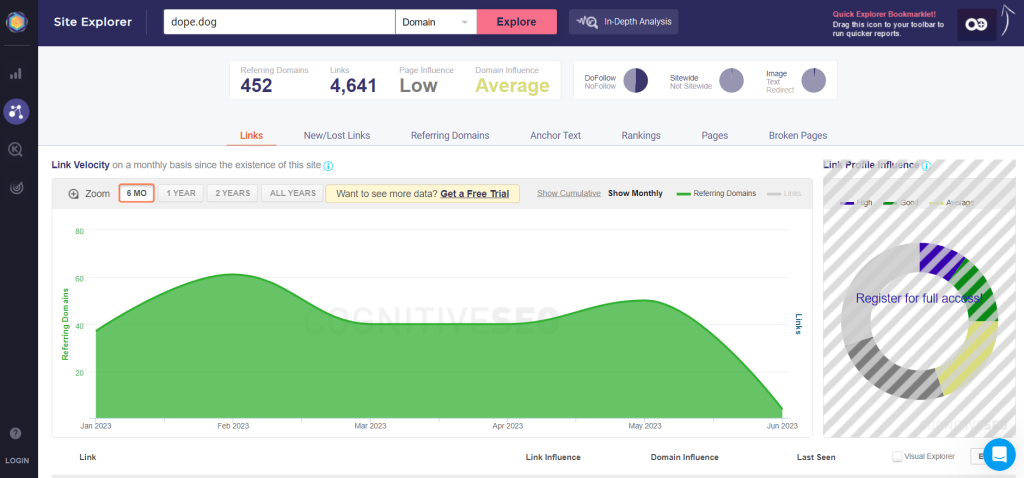
Thanks to Cognitive SEO, you’ll know if websites of your same niche are linking to you.
| Advantages | Disadvantages |
|---|---|
| It’s very effective for marketing campaigns | It has few report customization options |
| Constantly releases updates and improvements | Exported data can sometimes be confusing |
| Its keyword analysis is among the best | The interface is not very clear |
We would define Cognitive SEO as both an On Page and Off Page SEO tool. Having said that, if I had to highlight one aspect, I would focus on its Off Page analysis as it leverages data from tools like Ahrefs, Majestic SEO, and MOZ to provide the most comprehensive information about any website.
One of its most intriguing features is that it crawls every incoming link to your website individually and assigns it a level of authority, allowing you to discern which links are beneficial and which aren’t.
This information is showcased in color-coded charts, enabling a quick analysis in just a few minutes, as well as helping you identify a potential negative SEO attack.
What’s the upside of using Cognitive SEO? You can perform this same analysis on competitor websites to see who is linking to them. In other words, it’s a fantastic tool for viewing your competitors’ external links.
Additionally, and here’s the good part, you can also see where each of those links is placed and, therefore, replicate the strategy if necessary.
Another aspect that we particularly liked about this tool is its Link Velocity function, which allows you to see the pace at which incoming links are being created.
This way, you can either accelerate or slow down your linkbuilding strategy to make it appear as natural as possible and avoid raising suspicions with Google by having too many incoming links in a short period.
But that’s not all, Cognitive SEO also assists you in creating SEO reports for yourself or for your clients. It’s as simple as dragging widgets with the information you want to the report panel and generating it.
If you have a logo for your agency, you can include it so that the document has a more personalized and corporate look.
Netpeak, tailored audits
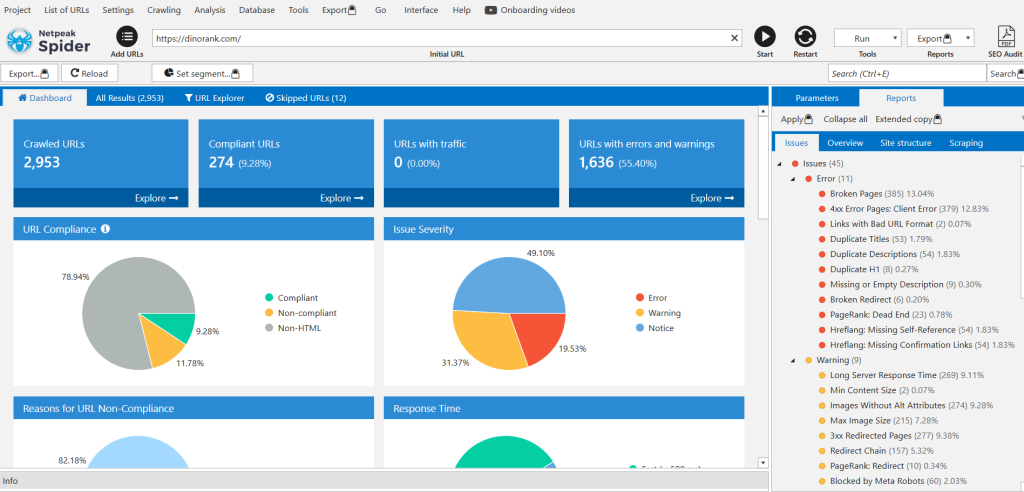
Netpeak is one of the most recommended tools for performing a comprehensive SEO audit of a website
| Advantages | Disadvantages |
|---|---|
| Allows customization of audit data | Takes some time to learn how to use it |
| Gathers metrics from other SEO tools | No online version, software installation required |
| Can audit multiple websites simultaneously | No integration with Google Analytics or Search Console |
Unlike the previous ones, Neatpeak is an SEO program, that is, software that you must install on your computer to be able to use it.
Is it worth it then? Well, if you need to perform a detailed On-page analysis, I’d say yes because once you enter the domain, this tool is capable of analyzing more than 50 factors that affect SEO, moving page by page and informing you about the errors it finds on each of them.
Among these factors, there are essential data such as detecting duplicate content, analyzing the framework of incoming and outgoing links, checking the HTML structure as well as titles and descriptions, looking for 404 errors, and testing response time, among others.
Thanks to Netpeak, you will have in your hands a comprehensive document with all the SEO information you need to improve the positioning of your blog or website on Google.
Likewise, another feature that we would highlight from NeatPeak is the one that allows you to compare domains based on metrics from other tools, such as Moz and Majestic. That is, it alone concentrates key information from other Off-page SEO tools to save you time.
SE Rankings: discover all the errors on your website
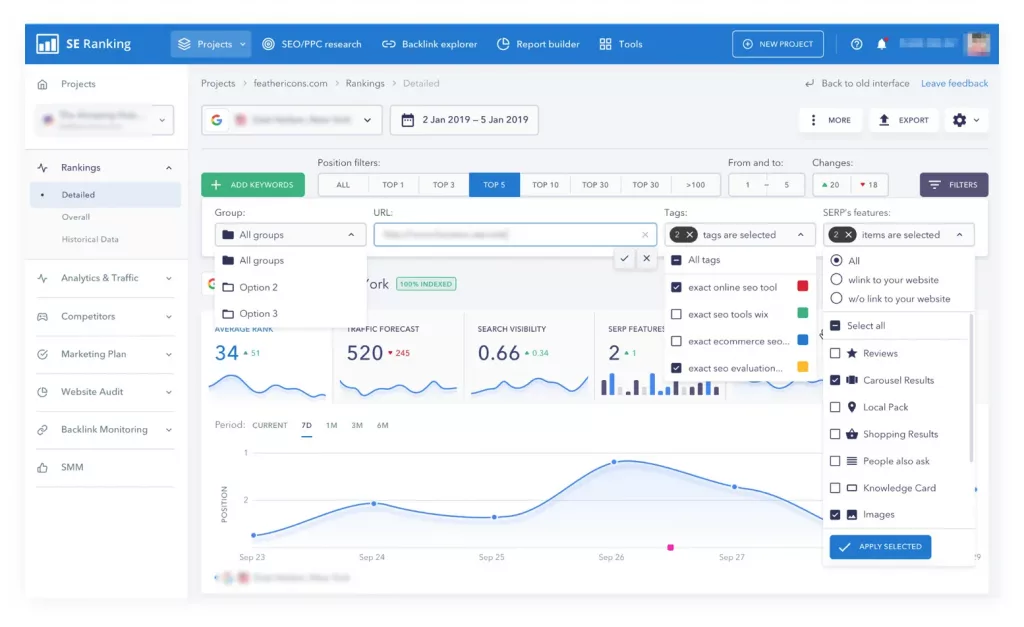
SE Ranking utilizes data from Yoast SEO to help you enhance the meta tags of your posts.
| Advantages | Disadvantages |
|---|---|
| Monitors the changes you make on the website | Takes a long time to crawl a project |
| Has a free version | Not suitable for local SEO |
| Its interface is user-friendly and easy to use | The database is still small |
SE Ranking proudly promotes itself as an All-In-One solution, boasting a myriad of modules tailored to manage your website’s SEO seamlessly. Out of its many features, I’m particularly impressed by the SEO audit component. It delivers a comprehensive report in record time, boasting the ability to scan up to 1,000 pages in just 2 minutes (assuming, of course, your hosting can keep up).
Its key auditing feature, the “On-Page SEO Checker”, diligently scours for issues like meta tags, URLs, loading speed, backlinks, images, sitemaps, headers, robot instructions, and more. Once identified, it’s just a matter of diving into the details to discern how to rectify them, enhancing your site’s SEO in the process.
For a more user-friendly experience, SE Ranking sorts these hiccups into two categories: Major and Minor. This distinction helps you quickly pinpoint which issues to prioritize, streamlining the optimization of your site.
And don’t worry about feeling overwhelmed; the platform also highlights what’s working well, giving you a clear indication of areas you shouldn’t tamper with. As you rectify issues, you’ll notice a positive shift in the site’s score, which is derived from this very audit.
Another nifty feature? SE Ranking stores these reports and promptly alerts you when any changes are detected, enabling you to update your audit. It’s an excellent way to showcase the fruits of your labor to clients and maintain your documentation in tip-top shape.
To cap it all off, one cannot overlook one significant advantage. SE Ranking offers one of the most competitive prices in the market, making it a go-to choice for those dipping their toes into the world of organic Google ranking.
SEO SiteCheckup: The Most User-Friendly Analysis Tool on the Block.
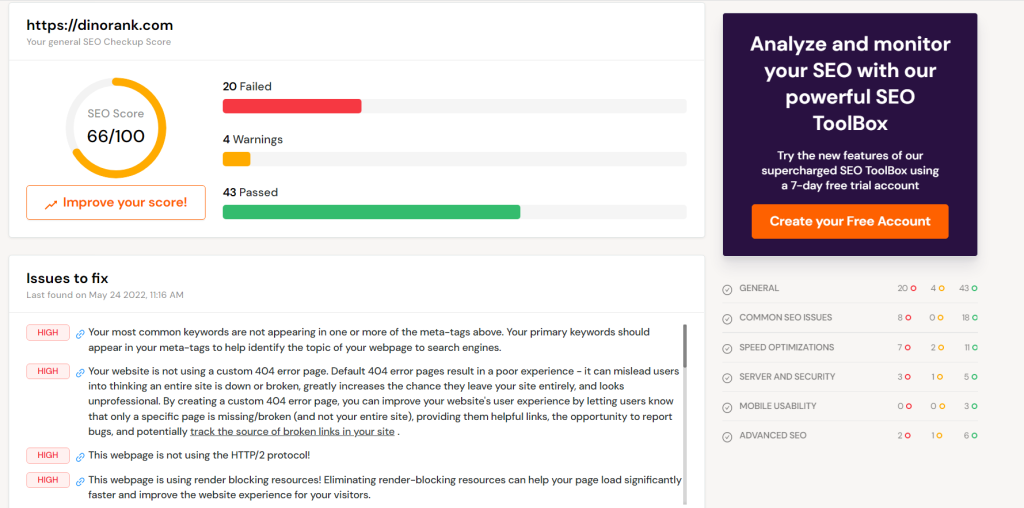
SEO SiteCheckup is an online tool that provides automated SEO audits, in-depth analysis, and actionable recommendations to boost website performance.
| Pros | Cons |
|---|---|
| Responsive design ensures mobile-friendly use. | Slow customer support response. |
| All tools come with a free version. | Struggles to accurately monitor data from Spain. |
| Access all reports and analyses from the desktop with a single click. | Reports aren’t provided in real-time. |
Previously, it was a freely available SEO tool. However, as tends to happen, as it grew in popularity, some of its functionalities were restricted. Now, you can use its 30-day trial to test it out for free and conduct various audits.
It’s worth noting that this tool analyzes nearly 70 aspects of your website, such as 404 errors, canonical tags, HTML compression, and backlinks, as well as Web Performance Optimization (WPO) factors.
Regarding its use, I must say that it’s a very user-friendly tool. All you have to do is enter the URL of the site you want to analyze, and if you’re registered, you’ll receive emails whenever your website’s score changes.
Once it has evaluated these elements, SEO SiteCheckup will give your website a score ranging from 0 to 100 based on its characteristics. Moreover, it provides a report detailing the most critical corrections needed.
Link Explorer (formerly Open Site Explorer)
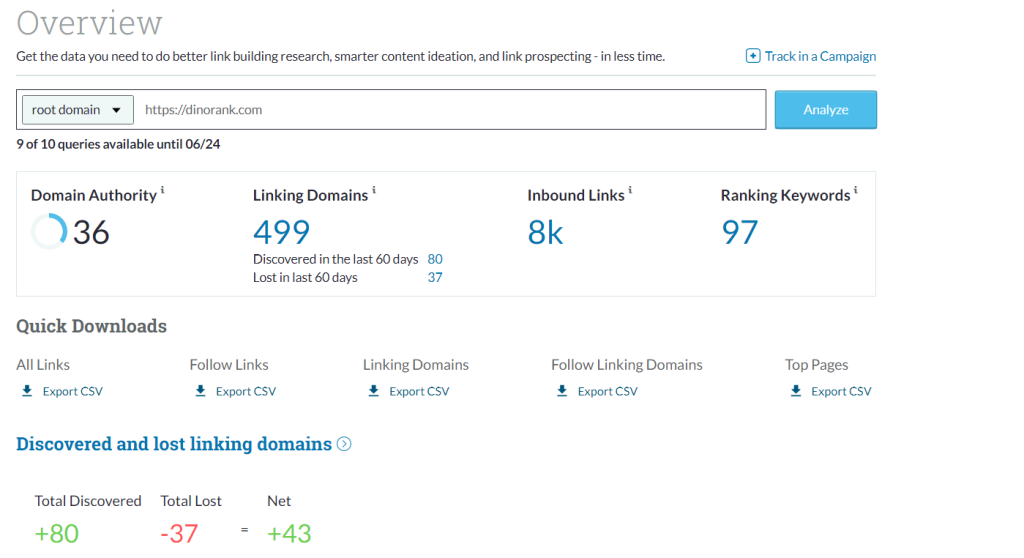
Free tool to analyze competitors’ links
| Advantages | Disadvantages |
|---|---|
| Delivers results quickly. | Must have the paid version of Moz for all features. |
| Its anchor text tool is among the most comprehensive. | Limited campaigns; not suited for agencies. |
| Displays data with clear graphics and schematics. | Report downloads are not immediate. |
Moz is universally recognized as one of the top SEO positioning tools out there. However, not everyone can afford the roughly $100 price tag for its most basic plan.
That’s why they introduced a specific tool called Link Explorer, which allows you to evaluate up to 10 links per month for free, once you’ve registered.
If you decide to give this tool a whirl, you’ll receive truly high-quality, detailed information, including the well-known metrics of DA (Domain Authority) and PA (Page Authority).
Additionally, it tracks links over time, preserving historical data so you can monitor their progression. In other words, you can see how many links you’re gaining or losing over time. Alongside each link, you’ll also find the anchor text used.
Another compelling feature of this tool is the array of filters you can apply to your backlink list for deeper analysis.
These filters can be based on the destination – to search for all links directing to a specific URL on your website; the link’s origin – to discern how many links you’re receiving from a particular domain; and the type of link (follow, no follow, etc.)
With the Linking Domains feature, you can view a list of all the domains pointing to your website, making it easier to evaluate their authority to determine if those links are beneficial.
Similarly, the Anchor Text function provides a list of all anchor texts used to link to you.
Furthermore, there’s an option to export all this data into a CSV file.
Best Free SEO Tools
Whether you’re new to the SEO game, just looking to boost your blog’s ranking, or simply aiming to cut costs, you might initially lean towards free SEO tools to assist you with your website optimization tasks.
Screaming Frog
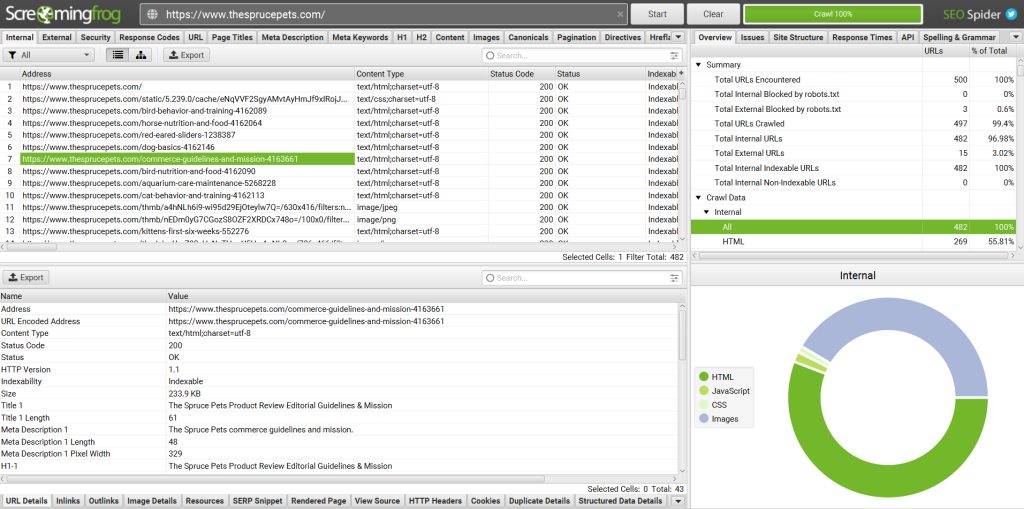
A crawler that helps you pinpoint all the On-page errors on your website.
| Pros | Cons |
|---|---|
| Allows scheduled crawls and automated data exports | The interface is not very user-friendly and can be complex |
| Capable of identifying technical errors | It’s installed on the PC, so you can’t access it from any computer |
| You can download almost all displayed data | It might take too long to crawl a website |
Unlike the others, Screaming Frog is a pure crawler, meaning it’s like a spider designed to navigate the website of your choice and gather On Page information. As such, it’s a powerful tool to monitor the status of your URLs, internal linking, Page Rank, and more.
Additionally, thanks to its APIs, you can connect it to other SEO tools, such as Google Search Console, Ahrefs, or Moz, to cross-reference data and also dive into Off Page metrics.
However, it’s an SEO software that you need to install on your computer, so it’s not like other platforms that you access through a browser.
It’s one of the most popular free SEO tools because its crawler is very effective at retrieving all sorts of information from a webpage.
That being said, the free version has a limit of 500 URLs per website. So if you’re working with larger projects, Screaming Frog might leave the job half done.
Google Trends
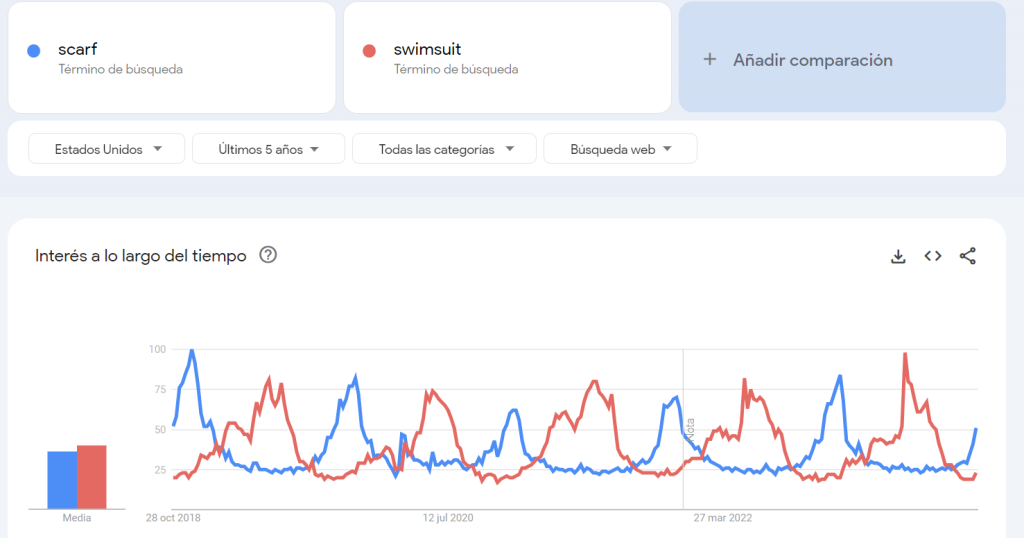
A tool to track the trend of a keyword over a specific period.
| Advantages | Disadvantages |
|---|---|
| Features straightforward comparative tables | Doesn’t show the exact search volume, only a range |
| Simple and quick to use | Limits comparison to 5 keywords at a time |
| Provides extensive local search data | Doesn’t integrate well with other SEO tools |
This is one of the free SEO tools that Google offers you, and in this instance, it’s designed to help you identify search trends for a topic, keyword, or brand almost in real-time.
With it, you can potentially predict user behavior around a particular keyword or subject, and determine when it’s trending. This allows you to craft content ahead of the curve, aiming for better search ranking.
Additionally, it provides insight about specific keywords, local SEO, and how you fare compared to your main competitors.
Google Search Console
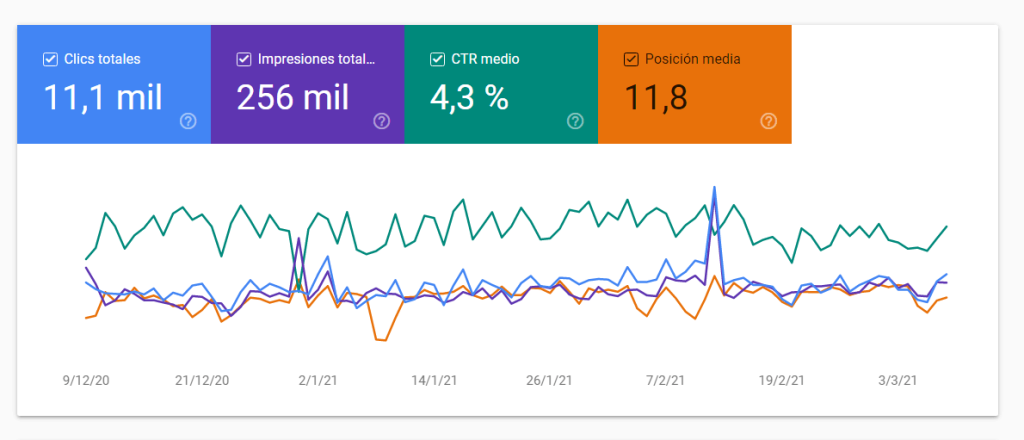
An online SEO tool for monitoring all the organic traffic on your website.
| Advantages | Disadvantages |
|---|---|
| Provides detailed reports | The URL inspection tool isn’t very accurate |
| Allows you to see the keywords you rank for | Struggles with indexing issues |
| Detects user experience errors | Doesn’t display real-time information |
Google Search Console is an indispensable free SEO tool provided by Google, one you simply must have in your arsenal.
While it may not have specific SEO functionalities, it does offer a plethora of data that can be leveraged with many of the other tools we’ve touched upon in this article.
You can view the impressions and clicks on your URLs, determine which keywords are boosting your rankings, discover the terms users are employing to find you, identify error-prone URLs, and more.
However, it’s worth noting that registering your website with Google Search is a prerequisite for accessing the functionalities of some of the aforementioned SEO tools.
Google Analytics
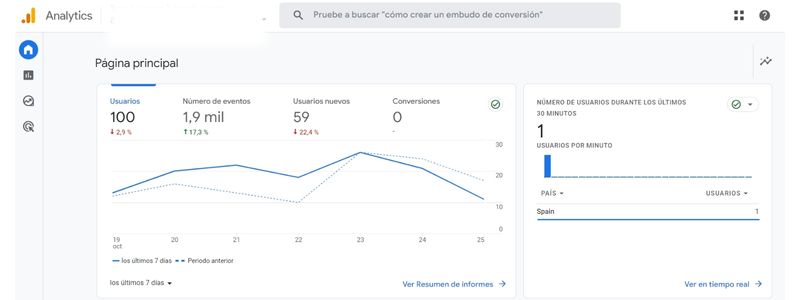
SEO analytics tool that allows you to see all the actions taken within your website.
| Advantages | Disadvantages |
|---|---|
| Allows measurement of almost everything on your website | Can be quite challenging to use |
| Provides real-time information | User must accept cookies to gather data |
| Highly customizable | At times, requires support from Google Tag Manager |
Google Analytics 4 is the successor to the renowned Universal Analytics, an SEO tool that zooms in on user activity on our website. This enables us to track and dissect specific actions visitors take, from clicking a link to completing a purchase.
The main difference between this new version and its predecessor lies in the shift to a user-event-centric approach, marking a significant change.
This, among other factors, is why it hasn’t fully settled in the SEO community yet. Plus, it’s still under development, meaning not all required functionalities are in place.
In many cases, you’ll need to turn to Google Tag Manager (GTM) to execute various actions.
SEO Extensions
To round off our list, we’ll introduce 2 browser extensions that offer valuable insights while analyzing the SERPs:
SEO Minion

Paid SEO extension that provides detailed On Page data for each URL.
| Advantages | Disadvantages |
|---|---|
| Clear and reliable data | Information can be too superficial in certain cases |
| Detailed link analysis | No longer free |
| Very useful for verifying languages on a website | Doesn’t measure the positioning of URLs |
In the case of SEO Minion, we’re talking about an extension for Google Chrome and Firefox that allows you to quickly perform an SEO analysis of the webpage you’re browsing.
In fact, many SEO professionals use it for quick checks on the go, even if they are already using paid SEO tools like the ones we’ve mentioned so far.
It has some interesting features, such as comparing SERPs in different countries for the same keyword or previewing your snippets in Google’s results.
However, it’s worth noting that in June 2025, it was acquired by Keywords Everywhere and has since become a paid tool. That said, it has expanded its range of functionalities, allowing you to:
- Conduct On Page analysis.
- Check for broken links.
- Simulate SERPs in various countries.
- Verify redirects.
- Check HTML tags such as Hreflang.
Keyword surfer
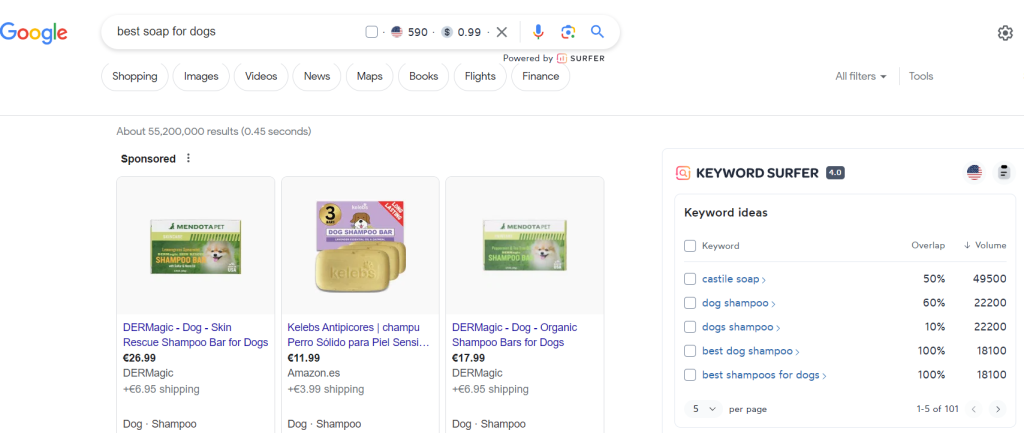
Free extension to view the search volumes of each keyword and its main derivatives.
| Advantages | Disadvantages |
|---|---|
| Saves time when analyzing keywords | Sometimes suggests related keywords that don’t make sense |
| Has a very simple interface | Occasionally freezes and requires restarting the extension |
| Can complement other tools | Not suitable for in-depth keyword research |
If you were surprised that SEO Minion is paid, don’t worry, because now we bring you a free SEO extension. This is Keyword Surfer, a tool focused on keyword research.
Basically, what this tool does is tell you the search volume of keywords you enter into the Google search engine as well as their CPC and several derivatives.
In addition, it provides you with a list of related keywords, so it’s a very quick way to do basic keyword research: you see the SERPs, the search volume, and long-tail keywords all at once.
Our conclusion about SEO tools in 2025
In this post, we have presented a comprehensive list of SEO tools classified by functions but, as you may have noticed, many of them are authentic All-In-One suites that combine various aspects.
Now it’s up to you to determine which one best fits your needs. To do this, don’t hesitate to test them, taking advantage of the fact that most of them offer trial periods or free registration, and choose the one that best suits what you need.
However, these are not the only SEO tools out there, and there are many more on the market, perhaps lesser-known or with more limited functions, that can still be useful. Remember that you also have Google’s SEO tools.
To continue listing tools would make this list endless, so we will simply enumerate a few for you to keep in mind (in case the ones we have presented seemed too few):
- Woorank. Thanks to this tool, you can get a complete audit of your website not only in terms of SEO but also in the realm of social media. It also helps you create a marketing plan. We recommend it if you focus your strategy on Social Media.
- QuickSprout. Although free, it’s not a very well-known tool perhaps because it offers somewhat superficial data, but no less useful. Thanks to it, you’ll have a general vision of your website’s SEO and you’ll get some tips to improve your web positioning.
- SiteAnalyzer. As its name indicates, it’s the perfect tool to analyze your website divided into categories: SEO, Accessibility, Content, Performance, and Design. Once done, it will indicate in order of priority the problems you should solve.
- Keyword Researcher. This is a paid tool focused not only on keywords but on long-tail keywords. Additionally, it divides them between the best and worst, so you can select those with which to create good content, that is, it discards for you the less interesting ones to rank.
- SEO Quake. This tool differs from the rest in that it’s not a website like the others but a plugin that is installed in the Internet browser you usually use. With just one click, you’ll get a basic On Page SEO analysis along with a list of the keywords that appear and their density.
- Seorch. Little known but free and effective, especially if what you need is not a complete SEO audit but to gather basic information about a website. It’s perfect if you’re starting in the world of SEO.
- Ubersuggest: developed by digital marketing expert Neil Patel, it’s an essential tool for all those looking to optimize their content and SEO strategy. With this tool, you can obtain relevant keyword suggestions, analyze backlinks, and monitor the keywords you rank for.
- Pagespeed Insights from Google: more than an SEO tool, it’s a tool focused on improving WPO. It analyzes the loading speed of your website and provides you with a diagnosis with specific solutions to reduce loading times.
- Keyword Generator from Ahrefs: although we’ve already talked about Ahrefs before, a special mention deserves its Keyword Generator tool, which is one of the most used free SEO tools for keyword research at zero cost. This tool offers keyword suggestions based on real user queries, allowing you to identify high-value opportunities.
- Answer the Public: now owned by Neil Patel, this tool allows you to obtain a vast amount of long-tail keywords from the one you’ve entered in its search engine. Using this tool is free, but if you want to know the volumes and CPCs, you’ll have to switch to the paid module.
- SiteLiner. Thanks to this tool, you’ll have a complete analysis of your domain’s database in terms of average words, duplicated content, On Page SEO, number of external and internal links, average links per page…
As you can see, the market is full of all types of SEO tools from which you can benefit to improve your positioning.
This abundance of suites means there’s competition, and therefore, there’s a greater effort to improve and offer innovative features, something that ultimately benefits us as users.
If you don’t have many resources or money to invest, the best thing is to acquire an All-In-One SEO tool that contains various functionalities and allows you to do everything from one place.
However, if you are an agency and want to invest money, the best option is to get several highly specialized SEO tools, each one focused on a specific function.
We hope to have helped you with this post, and if you still know more tools to improve your website’s SEO in 2025, don’t hesitate to leave a comment below and make your recommendation.

